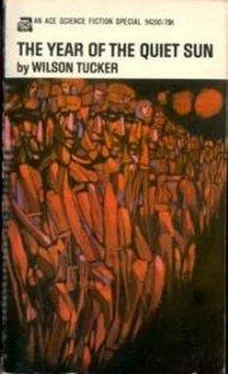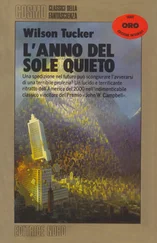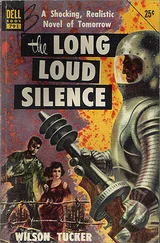Wilson Tucker - The Year of the Quiet Sun
Здесь есть возможность читать онлайн «Wilson Tucker - The Year of the Quiet Sun» весь текст электронной книги совершенно бесплатно (целиком полную версию без сокращений). В некоторых случаях можно слушать аудио, скачать через торрент в формате fb2 и присутствует краткое содержание. Год выпуска: 1970, ISBN: 1970, Издательство: Ace Books, Жанр: Фантастика и фэнтези, на английском языке. Описание произведения, (предисловие) а так же отзывы посетителей доступны на портале библиотеки ЛибКат.
- Название:The Year of the Quiet Sun
- Автор:
- Издательство:Ace Books
- Жанр:
- Год:1970
- ISBN:0-441-94201-6
- Рейтинг книги:3 / 5. Голосов: 1
-
Избранное:Добавить в избранное
- Отзывы:
-
Ваша оценка:
- 60
- 1
- 2
- 3
- 4
- 5
The Year of the Quiet Sun: краткое содержание, описание и аннотация
Предлагаем к чтению аннотацию, описание, краткое содержание или предисловие (зависит от того, что написал сам автор книги «The Year of the Quiet Sun»). Если вы не нашли необходимую информацию о книге — напишите в комментариях, мы постараемся отыскать её.
Won retrospective John W. Campbell Memorial Award in 1976.
Nominated for Nebula Award for Best Novel in 1970.
Nominated for Hugo Award for Best Novel in 1971.
The Year of the Quiet Sun — читать онлайн бесплатно полную книгу (весь текст) целиком
Ниже представлен текст книги, разбитый по страницам. Система сохранения места последней прочитанной страницы, позволяет с удобством читать онлайн бесплатно книгу «The Year of the Quiet Sun», без необходимости каждый раз заново искать на чём Вы остановились. Поставьте закладку, и сможете в любой момент перейти на страницу, на которой закончили чтение.
Интервал:
Закладка:
The civilians were herded into a large dining room and locked in. As soon as they were alone the aides brought out gas masks which had previously been concealed there; the party donned the masks and crawled under heavy dining tables to wait. Mortar fire was heard outside.
Electric power was restored at just one o’clock. The firing stopped.
FBI agents also wearing masks breached the door from the opposite side and informed the President the rebellion was ended. The Joint Chiefs of Staff and the disloyal troops had been taken under cover of a gas barrage, by an undisclosed number of agents backed by Federal marshals. Casualties among the troops were held to a minimum. The Joint Chiefs were unharmed.
Helicopters ferried the Presidential party back to Washington, where the President requested immediate reactivation of the TV networks to announce the news of the attempted coup and its subsequent failure. Congress was called into an emergency session, and at the request of the President declared the country under martial law. The affair was done.
A White House spokesman admitted that the plot was known well in advance, but refused to reveal the source of the tip. He said the action was allowed to go as far as it did only to ascertain the number and the identities of the troops who supported the Joint Chiefs. The spokesman denied rumors that those troops had been nervegassed. He said the plotters were being charged with treason and were being held in separate jails; he would not disclose the locations other than to say they were dispersed away from Washington. The spokesman declined to answer questions regarding the number of FBI agents and Federal marshals involved in the action; he shrugged off unofficial reports that thousands had been mustered.
The only reliable information known was that large numbers of them had lain in concealment about Camp David for several days prior to the action. The spokesman would say only the two groups had courageously rescued the President and his party.
Brian Chaney was unaware that the lights dimmed and the hurtful rubber band smashed against his eardrums; he didn’t hear the massive mallet smash into the block pf compressed air and then rebound with a soft, oily sigh. He didn’t know that Arthur Saltus had left him until he turned around and found himself alone.
Chaney stared around the empty shelter and shouted aloud: “Saltus!”
There was no answer.
He strode to the door and shouted into the corridor. “Saltus!”
Booming echoes, and then silence. The Commander was emerging from the vehicle at home base.
“Listen to the word from the ivory tower, Saltus! Listen to me! What do you want to bet the President didn’t risk his precious skin under a dining room table? What do you want to bet that he sent a double to Camp David? He’s no Greatheart, no Bayard; he couldn’t be certain of the outcome.” Chaney stepped into the corridor.
“ We tipped him off, you idiot — we passed the word. We told him of the plot and of his re-election. Do you really think he has the guts to expose himself? Knowing that he would be re-elected the next day for another four-year ride? Do you think that, Saltus?”
Monitoring cameras looked at him under bright lights.
In the closed-off operations room, the TDV came back for him with an explosive burst of air.
Chaney turned on his heel and walked into the shelter. The newspapers were stacked, the gear was stored away, the clothing was neatly hung on racks. He had arrived and was preparing to leave with scarcely a trace of his passage.
The torn envelope caught his eye — the instructions from Katrina, and his identification papers, his gate pass. Cool, impersonal, distant — impassive, reserved. The wife of Arthur Saltus giving him last minute instructions for the field trial. She still lived on station; she still worked for the Bureau and the secret project — and unless the Commander had been reassigned to the war theater he was living with her.
But the barracks were dark, padlocked.
Brian Chaney knew the strong conviction that he was gone — that he and the Major had left the station. He didn’t believe in crystal balls, in clairvoyance, hunches, precognition — Major Moresby could have all that claptrap to add to his library of phony prophets, but this one conviction was deeply fixed in his mind.
He was not here in November, 1980.
ELEVEN
Chaney sensed a subtle change in relationships. It was nothing he could clearly identify, mark, pin down, but a shade of difference was there.
Gilbert Seabrooke had sponsored a victory party on the night of their return, and the President telephoned from the White House to offer his congratulations on a good job well done. He spoke of an award, a medal to convey the grateful appreciation of a nation — even though the nation could not be informed of the stunning breakthrough. Brian Chaney responded with a polite thank you , and held his tongue. Seabrooke hovered nearby, watchful and alert.
The party wasn’t as successful as it might have been. Some indefinable element of spontaneity was missing, some elusive spark which, when struck, changes over an ordinary party into a memorable evening of pleasure. Chaney would remember the celebration, but not with heady delight. He passed over the champagne in favor of bourbon, but drank that sparingly. Major Moresby seemed withdrawn, troubled, brooding over some inner problem, and Chaney guessed he was already preoccupied with the startling power struggle which was yet two years away. Moresby had made a stiff, awkward little speech of thanks to the President, striving to assure him without words of his continued loyalty. Chaney was embarrassed for him.
Arthur Saltus danced. He monopolized Katrina, even to the point of ignoring her whispered suggestions that he give unequal time to Chaney and the Major. Chaney didn’t want to cut in. On another evening, another party before the field trials, he could have cut in as often as he dared, but now he sensed the same subtle change in Kathryn van Hise which was sensed in the others. The mountain of information brought back from Joliet, November 1980, had altered many viewpoints and the glossy overlay of the party could not conceal that alteration.
There was a stranger at the party, the liaison agent dispatched by the Senate subcommittee. Chaney discovered the man surreptitiously watching him.
The briefing room offered the familiar tableau.
Major Moresby was again studying a map of the Chicago area. He used a finger to mark the several major routes and backroads between Joliet and the metropolis; the finger also traced the rail line through the Chicago suburbs to the Loop. Arthur Saltus was studying the photographs he’d brought back from Joliet. He seemed particularly pleased with a print of an attractive girl standing on a windy street corner, half watching the cameraman and half watching for a car or a bus coming along the street behind. The print revealed an expert’s hand in composition and cropping, with the girl limned in sunny backlighting.
Kathryn van Hise said: “Mr. Chaney?”
He swung around to face her. “Yes, Miss van Hise?”
“The engineers have given me firm assurance that mistake will not happen again. They have used the time since your return to rebuild the gyroscope. The cause has been traced to a vacuum leakage but that has been repaired. The error is to be regretted, but it will not happen again.”
“But I like getting there first,” he protested. “That’s the only way I can assert seniority.”
“It will not happen again, sir.”
“Maybe. How do they know it won’t?”
Katrina studied him.
“The next targets will each be a year apart, sir, to obtain a wider coverage. Would you care to suggest a tentative date?”
Читать дальшеИнтервал:
Закладка:
Похожие книги на «The Year of the Quiet Sun»
Представляем Вашему вниманию похожие книги на «The Year of the Quiet Sun» списком для выбора. Мы отобрали схожую по названию и смыслу литературу в надежде предоставить читателям больше вариантов отыскать новые, интересные, ещё непрочитанные произведения.
Обсуждение, отзывы о книге «The Year of the Quiet Sun» и просто собственные мнения читателей. Оставьте ваши комментарии, напишите, что Вы думаете о произведении, его смысле или главных героях. Укажите что конкретно понравилось, а что нет, и почему Вы так считаете.












